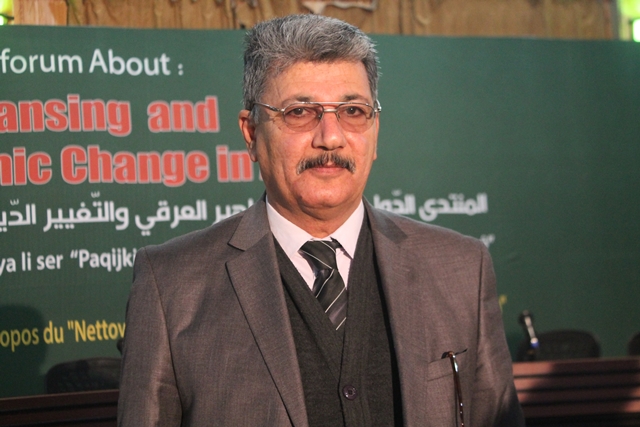Jawad Al-Baydani: Lausanne divided the region on the basis of economic interest and political weakening
Iraqi researcher Jawad Al-Baydani confirmed that the Treaty of Lausanne divided countries on the basis of economic interest and political weakening, noting that the leader Abdullah Ocalan touched on the issues and crises that the people of the region suffer from and provided solutions to them, and called for unity among the components on the basis of respect and common interests.

Crises in the Middle East have been going on for a hundred years, as a result of conspiracies, treaties, and agreements that were hatched against the people of the region, including Kurds, Arabs, and other components.
With the approaching centenary of the Treaty of Lausanne, which falls on July 24, and regarding the role of this treaty in dividing Kurdistan and turning the countries of the Middle East into authoritarian states, the Iraqi researcher in political history, Jawad al-Bayadani, considers that "the Treaty of Lausanne did not divide states on national grounds, but rather divided them on the basis of economic interest and political weakening."
He explained that "Europe encouraged the national spirit to emerge; to strike the Ottomans, but it secreted its interests first, that the national issue began to appear and develop, and some of the Arabs and even the Kurds and the Turks borrowed this spirit, but the Europeans secreted it for their interests first."
Al-Baydani believes that "the interests of states are to live together in a state dominated by democracy, which is compatible with the social structure of our societies. Each state has its own democratic concept, and each state consists of many nationalities. We must not reduce identity and live according to a system of rule of consensual unity, not coercive unity."
Al-Baydani explained this by saying, "The consensual unity is the basis for building our societies, and everyone within this unity maintains his identity, because the global systems all come together in the face of many dangers, including economic risks and the risks of climate change, which has become a great threat in the world, as well as the current conflict based on eliminating unipolarity and expanding it to a quadruple or a second polarity."
And he considered that "the political, social and economic conflict is what prompted Europe to reduce its differences and unite in standing up to Russia's ambitions in Ukraine, as well as reducing its dependence on the United States by relying on alternative energy, just as the African continent is also reducing its differences."
Al-Baydani called for uniting the ranks, which "should not be on the basis of identity and affiliation, but on the basis of consensual unity and common interests and developing them towards building respect in one country where a democratic system prevails based on a foundation that is compatible with our social structure, and that a Western democratic system should not be imposed."
The political history researcher pointed out that he "read many of Ocalan's books, which dealt with these issues, in which he portrayed that co-existence is based on giving me my identity in all its forms and you your identity in all its forms, within one framework, because national systems cannot succeed in our region specifically, as well as religious systems. We are a religiously and ethnically diverse region that cannot be governed by imposing one nationality on another. A state that is built on a national basis is bound to fail."
As for the Treaty of Lausanne, international treaties, according to the researcher in political history, are often beneficial to the authority and harmful to the people, especially countries that consist of several nationalities, and now, as we see in the South Caucasus, by extracting Karabakh from its population and throwing it to Azerbaijan, despite the difference in everything in terms of language and social structure.
T/ Satt.
ANHA













